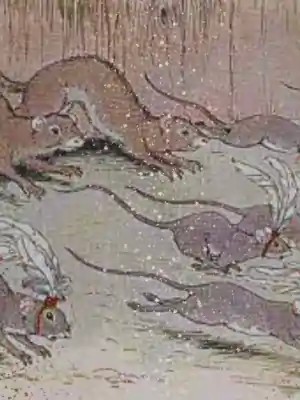The Mice and the Weasels
The Weasels and the Mice were always in conflict with each other. In every battle, the Weasels carried off the victory, as well as a large number of the Mice, which they ate for dinner the next day.

In despair, the Mice called a meeting, and there it was decided that the Mouse army was always beaten because it had no leaders.
So a large number of generals and commanders were appointed from among the most eminent Mice.
To distinguish themselves from the soldiers in the ranks, the new leaders proudly bound on their heads tall crests and ornaments of feathers or straw.
Then after long preparation of the Mouse army in all the arts of war, they sent a challenge to the Weasels.
The Weasels accepted the challenge with eagerness, for they were always ready for a fight when a meal was in sight.
They immediately attacked the Mouse army in large numbers. Soon the Mouse line gave way before the attack, and the whole army fled for cover.
The privates easily slipped into their holes, but the Mouse leaders could not squeeze through the narrow openings because of their headdresses. Not one escaped the teeth of the hungry Weasels.
Moral of the story
Leadership comes with responsibilities: Being in charge may have challenges and consequences.
Think practically: Consider the practical aspects of decisions, especially when it comes to appearances.
Questions for the children
- Why do you think the Mice decided to appoint new leaders?
- Can you imagine a time when looking impressive caused more problems than it solved?
Post Note: This story is based on Aesop’s fable, written around 600 BC. In this retelling, we’ve used simpler words to make the story easier for young readers to understand.





